FREE Standard Shipping On All Orders $100 or More!*
How Long to Run Pool Pump?
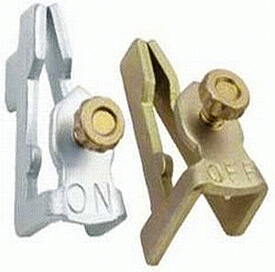
How long you need to run the pump depends on how efficient and effective your filter system is - and the also time of year, or water temperatures.
An average amount may be 12 hours summer, and 6 hours winter, but there are many variables that affect how much filtering your water needs.
Some systems may need to run nearly 24/7 to keep the water clear while others can do it in 6 hrs per day.
The question "How long should I run my pool pump?" is difficult to answer, without asking more questions, like:
- What type and size of pump and filter do you have?
- What water treatment chemicals or purifiers do you use?
- How much debris enters the pool? Precipitation?
- Temperatures: Air & Water?
Pump & Filter
When a pool builder or a manufacturer designs a pool, aboveground or inground, most use an 8-hour Turnover formula to size the pool pump and filter. That is, the size of the pump and matching filter is large enough to pump and filter ALL of the water in the pool, in an 8 hour time period.
For a 20,000 gallon pool, an 8-hour filter system (pump, filter, valves, pipes) would be designed to produce at least 42 gallons per minute, or gpm. (480 mins X 42 gpm = 20160).
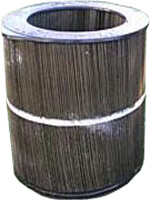
However, in the real world, filters get dirty and pump baskets get clogged, which slows down water flow. Additional equipment like chlorinators, heaters, cleaners are often added; slowing down flow rates by adding more resistance, requiring more filter pump run time.
The age of the filter media is another variable. Older filter sand or cartridges just don't filter as well as they used to, and will require more cleaning and longer pool pump operation times.
And of course, not all pool filters are created equal. D.E. pool filters are up to 10x more efficient than sand filters, filtering down a a very small particle size. A sand or cartridge filter will need to run the filter pump longer, than an equivalent sized DE filter.
In short, if your water is over-filtered, you can run the pool pump less hours per day, but small or less effective pool filters require more hours per day of running the pump, to compensate. Many pools need 2 full turnovers during summer to maintain water quality.
Water Treatments
How clean is your water? Pools that are over-treated require less pump circulation and filtration, to a certain degree.
Using supplemental water treatments such Ozone or Minerals can drastically reduce the amount of chlorine needed. They also purify the water, by removing tiny particles, helping out your pool filter.
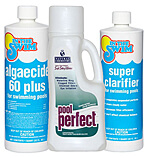
Specialty chemicals such as Enzymes, Clarifiers and Algaecides can also affect how long you should run the pool pump. Clarifiers are great filter helpers, enzymes remove filter clogging oils, and algaecides prevent tiny spores from growing into visible, filter clogging colonies.
We are all guilty of letting the chlorine level slip from time to time, or finding our water balance out of whack. Running the filter pump longer each day provides protection against low chlorine or stabilizer levels, or high pH and alkalinity levels.
In short, you can run the pool pump less often if your water is over-treated, if not, you may need to run the pump longer each day.
Debris in the Pool?
This question is pertinent because organic debris sucks up sanitizers, affects water balance and clogs up pumps and filters.
Pools that are in a desert environment can have nearly no debris (sand doesn't count, it's inert) - while pools in wooded areas can be surrounded by dense forests or lush landscaping.
Debris can stain your pool if the water is stagnant for too many hours. Circulation helps prevent staining, and brings micro-particles from leaves, twigs, bugs into the filter.
Heavy rainfall also means you should run the filter pump longer. Rain washes in lots of pollutants, dust and oils, and heavy storms wash off of nearby trees or flow into the pool from nearby planters. This brings in phosphates, nitrates, microbes and other stuff you don't want in the pool.
In short, a neat and tidy pool can run the pump for fewer hours per day than a pool surrounded by trees - unless that pool receives 6-8 hours per day of direct sun, which means - run the pump longer.
Temperature: Air & Water
During the off-season, with water temperatures below 60°, you can run the pool pump less than 6 hours per day, in most cases. But as the water warms up into the 70's you should run the pool pump longer each day.
When the pool water reaches the 80's, your water may need 2 full turnovers to stay clean and clear, or 12 hours at a minimum. For pools that get very warm with long, sunny summer days, run the pump as much as 18 hours per day, or as needed, to keep the water clear.
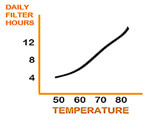
50-60° - 4-6 hours per day.
60-70° - 6-8 hours per day.
70-80° - 8-12 hours per day.
80-90° - 12-18 hours per day.
In short, run the pump more when the air & water temperatures rise - but also consider the other factors above; regarding filter effectiveness, water treatments and amount and type of debris and rain in the pool.
What's the Best Time of Day to Run the Pump?
During the daytime, when the sun is shining on the pool, and during the warmest hours of the day. Unfortunately, these are also peak hours for energy consumption, but it is the best time of day to run the pool pump.
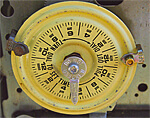
Use a timeclock to operate your pool pump, and reset it as needed, to maintain water clarity. If you don't have a timeclock, you may as well just run the pool pump 24 hrs/day, so you don't forget to turn it back on.
If you worry too much about how long to run the pump, or forget to turn it back on - the water condition can quickly deteriorate, requiring expensive chemicals and extra filtering to bring it back.
it's best to over-filter the water by running the pump about 12 hours per day, give or take, or as needed, to maintain water clarity.
Pay close attention to the water quality, or the condition of the water, and you can tell when you need to increase the amount of time that you run the pump each day.
When the pool is clean and the chemistry is good, but the water is a little dull or hazy, run the pool pump [to filter the water] a bit longer each day.